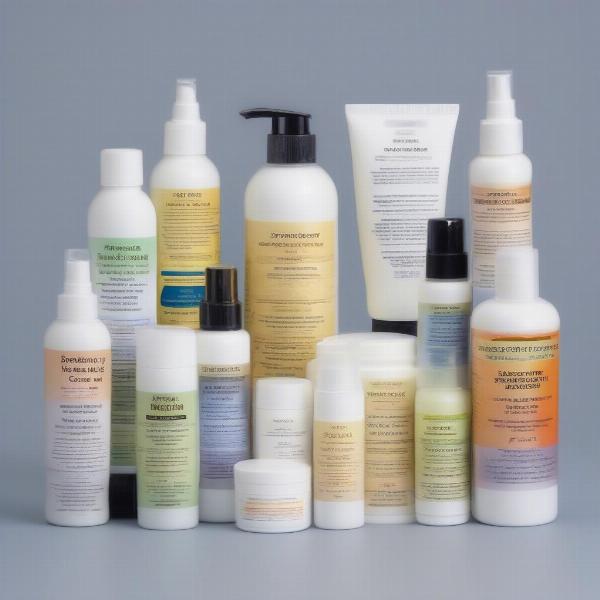Hot spot cream for dogs can be a lifesaver for your itchy companion. These inflamed, moist lesions, also known as acute moist dermatitis, can appear seemingly overnight and cause significant discomfort. This guide will explore everything you need to know about hot spot creams, from identifying the causes and symptoms to choosing the right treatment and preventing future occurrences.
Understanding Hot Spots in Dogs
Hot spots are a common skin issue in dogs, often triggered by a localized irritation that your dog then exacerbates by licking, chewing, and scratching. This creates a vicious cycle, leading to a rapidly spreading, painful lesion. Identifying a hot spot early is crucial for effective treatment.
Identifying the Culprits: Causes of Hot Spots
Several factors can contribute to hot spots. These include:
- Allergies: Flea bites, food allergies, and environmental allergens can trigger intense itching.
- Parasites: Fleas, ticks, and mites can irritate the skin and lead to hot spots.
- Moisture: A damp coat, especially in breeds with thick fur, can create a breeding ground for bacteria and yeast, leading to hot spots.
- Underlying medical conditions: Skin infections, hormonal imbalances, and even arthritis can contribute to hot spot development.
- Stress and boredom: These can lead to excessive licking and chewing, potentially causing hot spots.
Recognizing the Signs: Symptoms of Hot Spots
Hot spots are usually easy to spot. Look for:
- Red, inflamed skin: The area will appear significantly irritated.
- Moist, oozing lesion: A discharge is often present.
- Hair loss: The fur around the hot spot will be thinned or missing.
- Intense itching and licking: Your dog will be constantly focused on the area.
- Pain and discomfort: The area will be sensitive to the touch.
Choosing the Right Hot Spot Cream for Your Dog
Selecting the appropriate hot spot cream is vital for effective treatment. Several types of creams are available, each with its own benefits and drawbacks.
Types of Hot Spot Creams
- Antibacterial creams: These creams help combat bacterial infections, a common complication of hot spots.
- Antifungal creams: These target yeast infections, another frequent issue in hot spots.
- Steroid creams: These can reduce inflammation and itching, but should only be used under veterinary guidance.
- Soothing creams and sprays: These can provide temporary relief from itching and discomfort.
 Different Types of Hot Spot Cream
Different Types of Hot Spot Cream
Consulting Your Veterinarian
While some mild hot spots may respond to over-the-counter treatments, it’s always best to consult your veterinarian. They can accurately diagnose the underlying cause, recommend the appropriate treatment, and rule out any other medical conditions.
Preventing Hot Spots: Proactive Measures
Prevention is key when it comes to hot spots. By taking proactive measures, you can significantly reduce the risk of your dog developing these uncomfortable lesions.
Key Preventive Steps
- Regular grooming: Keep your dog’s coat clean and dry, especially during humid weather.
- Parasite control: Use effective flea and tick prevention methods.
- Allergy management: Identify and address any underlying allergies.
- Dietary adjustments: A balanced diet can support healthy skin and coat.
- Stress reduction: Provide a stimulating environment and address any anxiety issues.
Conclusion
Hot spot cream for dogs can be an essential tool in managing these painful skin lesions. By understanding the causes, symptoms, and treatment options, you can provide your furry friend with the relief they need. Remember to consult your veterinarian for accurate diagnosis and treatment recommendations. Preventing hot spots through proactive measures is crucial for long-term skin health.
FAQ
- What does a hot spot look like on a dog? A hot spot typically appears as a red, inflamed, moist lesion with hair loss around the affected area.
- Can I use human hot spot cream on my dog? No, it’s important to use products specifically formulated for dogs.
- How long does it take for a hot spot to heal? With proper treatment, a hot spot can heal within a week or two.
- Are hot spots contagious? Hot spots themselves are not contagious, but the underlying causes, such as infections, can be.
- How can I prevent my dog from licking a hot spot? An Elizabethan collar can prevent your dog from further irritating the area.
- Can stress cause hot spots in dogs? Yes, stress and boredom can lead to excessive licking and chewing, potentially causing hot spots.
- What is the best hot spot cream for dogs? Your veterinarian can recommend the most suitable cream based on your dog’s individual needs.
ILM Dog is a leading international online resource dedicated to providing expert advice on dog care and wellbeing. From breed selection and puppy care to senior dog health and training tips, we offer a wealth of information to help you provide the best possible care for your canine companion. We also specialize in providing guidance on dog health, nutrition, grooming, and product recommendations. For personalized advice and support, reach out to our experts at [email protected] or call us at +44 20-3965-8624. ILM Dog is here to support you every step of the way on your dog ownership journey.